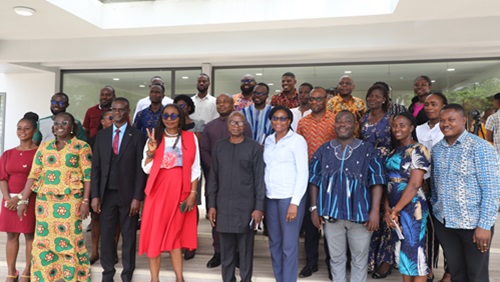
Labour Ministry to undertake survey to address skill gaps
Starting next month, the Ministry of Labour, Jobs and Employment (MLJE) will roll out a nationwide Qualifications and Skills Mismatches Survey (QSMS) targeting individuals in employment across both the formal and informal sectors.
The objective is to generate data that will inform evidence-based policymaking, particularly to bridge the gap between education, skills and the labour sectors.
The QSMS, as defined by the International Labour Organisation (ILO), assesses the extent to which workers’ qualifications and skills align with the requirements of their jobs.
It identifies mismatches such as underqualification, overqualification, or a disconnect between the skills held by workers and those demanded by employers.
In collaboration with the Ghana Statistical Service (GSS), the national QSMS project aims at measuring the prevalence of skills and qualifications mismatches in the Ghanaian workforce.
The data collected will support the development of policies that better match education and training programmes to labour market needs, while also serving as a complementary measure of labour underutilisation in sectors within regions across the country.
As part of preparations for the upcoming survey, the ministry held a stakeholder engagement last Wednesday in Accra, bringing together representatives from the education sector, as well as public and private institutions.
Participants discussed the institutional and individual components of the QSMS and deliberated on the way forward for the successful implementation of the national project.
In attendance were the Director, Research, Statistics and Information Management, MLJE, Shadrack Mensah; acting Chief Director, Gloria Borteley Noi; Vice-Chancellor of the University of Professional Studies, Accra, Prof. John Kwaku Mensah Mawutor; representative of the Ghana Employers Association, Kingsley Narh, and Bernard Adjei from the Fair Wages and Salaries Commission.
Comprehensive data
The Minister of Labour, Jobs and Employment, Dr Rashid Pelpuo, in a speech read on his behalf by the Acting Chief Director, Gloria Borteley Noi, at the statekeholder engagement yesterday said as the lead policymaker on employment and labour-related issues, his outfit recognised the critical need for comprehensive data to address mismatches in employment.
"The QSMS will be Ghana’s first nationally representative survey to measure these gaps across formal and informal employment sectors, inform policy, align education with labour market needs, and ultimately enhance productivity," Dr Pelpuo said.
Economic growth
The minister stressed that countries worldwide were focusing on economic growth by improving labour productivity, while economies like Ghana, which once absorbed many low-skilled workers, especially in agriculture, technological advancements were now reducing demand for such jobs.
"This challenge is compounded by the perceived shortage of critical skills and the mismatch between qualifications/skills and the labour market needs. These gaps hinder proper placement and utilisation of employees, affecting both formal and informal sectors of our economy," he said.
Pilot survey
The Director, Research, Statistics and Information Management, Mr Shadrack Mensah, mentioned that the ministry had already conducted a pilot survey in the Greater Accra, Northern, and Upper West regions to refine the survey instrument and monitoring frameworks, as well as build the capacity of field teams and identify logistical challenges.
He urged stakeholders, industrial leaders, policymakers, and development partners to actively support the survey's successful execution, which would provide valuable information to inform National Human Capital Development policies and programmes.
The Focal Person for the MLJE at the GSS, Jane Geraldo-Acolatse, emphasised that the GSS’s core mandate was to produce data and statistics to support policy formulation and evidence-based decision-making.
She added that the upcoming QSMS fell squarely within this mandate and appealed to all stakeholders, especially the media, to help raise public awareness of the survey.
That, she explained, would ensure smooth cooperation between field officers and respondents during the data collection process.